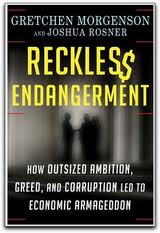Gretchen Morgenson’s new book about FNMA and the mortgage meltdown — Reckless Endangerment — is worth a careful read. There a few copies in the local library system and the Huffington Post ran a long excerpt.
The basic outlines of the story are familiar now — the mortgage industry broadly lost integrity, to the point where unscrupulous brokers were making loans that had no prospect of repayment and yet were able to sell the loans off into the secondary market with ease. Since the bubble finally burst, people have been losing their homes and the taxpayers have been picking up the pieces of the mortgage secondary market.
The book is worth reading because it documents how almost everyone in positions of economic leadership, whether from greed or ideological blindness, lost their way.
- The rating agencies failed to blow the whistle and kill a lucrative business rating collateralized mortgage obligations.
- Leading federal reserve bank economies endorsed the cause of broad housing ownership and failed to raise concerns about the housing bubble or the huge bloat of toxic sub-prime mortgages in the secondary markets.
- Wall Street was just making too much money on every stage of the secondary market process to put on the brakes — collecting fees from providing start-up (“warehouse”) credit lines to mortgage originators to packaging and trading the collateralized mortgage obligations.
- Politicians on both sides of the aisle were swept along by the a combination of (a) the appeal of broad home ownership; (b) an effective marketing campaign led by FNMA of aggressive lobbying, campaign contributions and community photo-ops with developers and lenders.
- The major federal mortgage entities — “Fannie and Freddie” — were run by political people who manipulated the accounting of the agencies to maximize their bonuses and were only about defending the profit opportunity that the special status of their agencies gave them in the market.
The most charitable way to look at the whole housing/home-equity bubble is that leadership went along with it because it allowed many of us to live more comfortably (although above our means) over a period of decades when the labor market has been moving in the wrong direction. A great many people have been unemployed, under-employed or under-paid as a result of international competition and automation. That’s the central problem we really need to face in the long term — how to put people back to work.


http://mitworld.mit.edu/video/51
Thomas L. Friedman gives a great lecture on the campus of MIT about the flattening of our World and the effects of globalization on the Marketplace.
When you take the cause of economic meltdown and turn it into the effect of union busting campaigns, you cheapen your seat at the table. Lax controls, lobbyists and Wall St greed caused the breakdown not collective bargaining and pensions for public employees. When things get hard for us we work harder with the tools at our disposal, we don’t change the rules.
Your charge should not be “jobs”, it should be to foster innovation, tearing down obstacles of free trade, opening doors for your constituents in the Global Marketplace and championing a fair tax structure. If, along the way, you felt campaign finance reform might help you to feel less enamored by those that would hinder those goals, so be it. The jobs will follow.
It’s not a long term issue, the need is now and we thirst for a leader who does not waffle in the wind like some slack jib on the newest current of warm air from Wisconsin without a compass.
Ride the green wave earnestly or walk the plank. Or, as Mr Friedman states, “Change your leaders not your light bulbs!”
Thanks, Dana. I agree — there is much more we need to do. The public employee piece is just a part of a much bigger picture.
The bigger picture brings into focus the corruption and greed that’s been painted by the brush of illusion. According to your comments above… Wall St causes the problem and blames the public unions while the wide eyed Pols with visions of sugar plum PAcs dance in their heads, take the bait, looking the other way. The result is the blue collar public servant is hurt by the economy, looses the hard fought benefits then has their money stolen by the same financial geniuses that caused the problem initially.
http://www.boston.com/business/articles/2011/06/14/bank_overcharged_pension_fund_by_20m_state_says/?p1=Well_Business_links
Don’t regulate the financial sector. Don’t tackle campaign finance laws. Keep the blinders in place and enjoy the Cubist picture your contemporaries have displayed so triumphantly with an impressionist’s brush. There was so much hope for you, a logical philosopher king but for you it’s just politics as usual, witnessed by a realists eye.